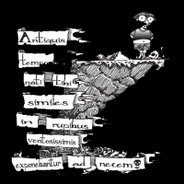Verbosity Ensues, by Pete Tzinski
Hello. I'm Pete Tzinski. I'm a writer.
I'm other things too (slushpile reader, husband, occasional Jambalaya maker, expectant father) but mostly, they're all just things which come out of being a writer. They are either interests which occur to me while writing and become full hobbies themselves, or things which I wind up doing because of being a writer.
(The bit about being an expectant father has nothing to do with being a writer, though. But let's move on.)
As I've been reading this 'yere BBT blog over the past few weeks, I've been reading posts about Boston, and about interesting haunted islands, and I've been thinking, what have I to contribute to the discussion of cool locations?
At the moment, none. I've lived in my fair share of very interesting places (we could do Virgin Island stories, for example) but right now, I am in Minnesota, where the most interesting thing that has happened today is that the temperature has just gone from single digit, to double digit. It's twelve degrees here. I can practically put on shorts.
So instead, I'll talk about writing. It's what I've got.
...
Out there, in this big wide world of ours, there is a lot of writing advice which is available to beginning authors. There are books, veritable tomes, full of ideas and tips and suggestions, there are magazines which can tell you the Top 10 Best Places To Write A Novel Now! and there are writers who are willing to give advice. All of this blends together into a sort of stew and all of it is good advice, sometimes, for some writers. Some of it can destroy careers.
Mostly, what you need are two quotes from two men, both brilliant writers and opinion-havers.
Harlen Ellison tells us "Don't write crap." (Actually, he tells Joe Straczysnki that, but he was speaking to the Joe Straczynski in all of us.)
Mark Twain tells us, "Eschew Surplusage."
That's all you need, honestly. That's my Five Words To Make You a Better Writer Now!
The Mark Twain quote is the one which I particularly wanted to talk about, in that I feel it's most important and most difficult. More difficult, perhaps, than Ellison's quote. There is no end of very creative and intelligent writers out there and many of them come up with wonderful ideas and great stories (and then, some of them don't. See the above bit where I read a slushpile.)
Many times, the learning process of being a writer is not the having of ideas, because everyone has ideas, but is the clearly communicating the ideas to the rest of the human race. The problem for writers is that the world around them is not built or geared toward writers. It's an uphill battle of sorts, or at the very least, it's going against the grain.
In school, they warn you from basic composition classes onward that you should never repeat words, that you should vary your word usage and come up with interesting and creative words to make your work really shine. But as a writer, how do you justify this with using "said?" Well, either you let adverbs into your life (and like Stephen King, I think this is a bad idea) or you go against what your teachers told you, what everyone else tells you, based on something that seems like a good idea in your head.
So much of learning to write is, as Mark Twain said, about learning to write simply. It's about learning to get into the boxing ring and pull your punches, not to gymnastics in an effort to intimidate your opponent, if you see what I mean.
...
As a closing comment (because you and I both have writing we should be doing, don't we? We cannot sit here all day.) I want to offer you this solution to help your writing along.
Pick out a short story that you've already written. Barring that, pick out a solid idea that you have in your head for a story you'd like to write. Or a piece of a story. Or a scene. It doesn't matter. If it's not written yet, write it.
Now, take what you've written and go stand in the middle of your living room. You can do this when you're home alone, or when your family is around.
Read it out loud. Read it as if you're standing on a stage in a darkened auditorium, with a hot light shining down on you and a sea of motionless faces in front of you. Read like you're trying to entertain this crowd.
How does your story read? If any parts embarrass you to read out loud, then I think you need to re-work them. I won't try to convince you that reading your stories out loud is going to solve every problem in writing, but I happen to think it will make it harder to write truly bad prose. Certainly, it makes it much harder to write atrocious dialogue. If, when reading out loud, your dialogue sounds like kids dramatically telling bad stories around a campfire (really, if any of your prose sounds like this) then it needs to die. It needs to be re-written.
For inspiration in all of this, look to British authors. For whatever reason, British authors write material which lends itself wonderfully to being read out loud, whether you have a wonderful British accent or an American one. There are American writers too, though, that you can look at. John Steinback, for example. These are authors whose works read well out loud, whose works become even more interesting when you buy a well-read audio book version of the stories.
Listen, pay attention, and then try it out for yourself. I think you'll find that if you have trouble with boring bits or bad dialogue, it will help to minimize it, or get rid of it.
In turn, by following Mark Twain's adage, I think you'll find yourself slowly coming 'round to Harlan Ellison's saying, because you'll find it harder and harder to write crap.
Let me know how it turns out, perhaps, in the comments of this post. Unless it turns out badly, and then we would like you to lie about it.
(Of course I'm kidding.)




2 comments:
Nice work here, and some great advice from the inimitable Mark Twain.
I was going to pear that word away, but I read it out loud, and it sounded great!
Well blogged! I would recommend that future entries include more discouraging comments, as it's not in our interest to inspire other writers to excellence.
For my part, I have found that through dedication, patience and effort of will, it has become more difficult for me to write crap.
I still manage to do write crap a fairly high percentage of the time, but that's just my own sticktoitivness.
Post a Comment